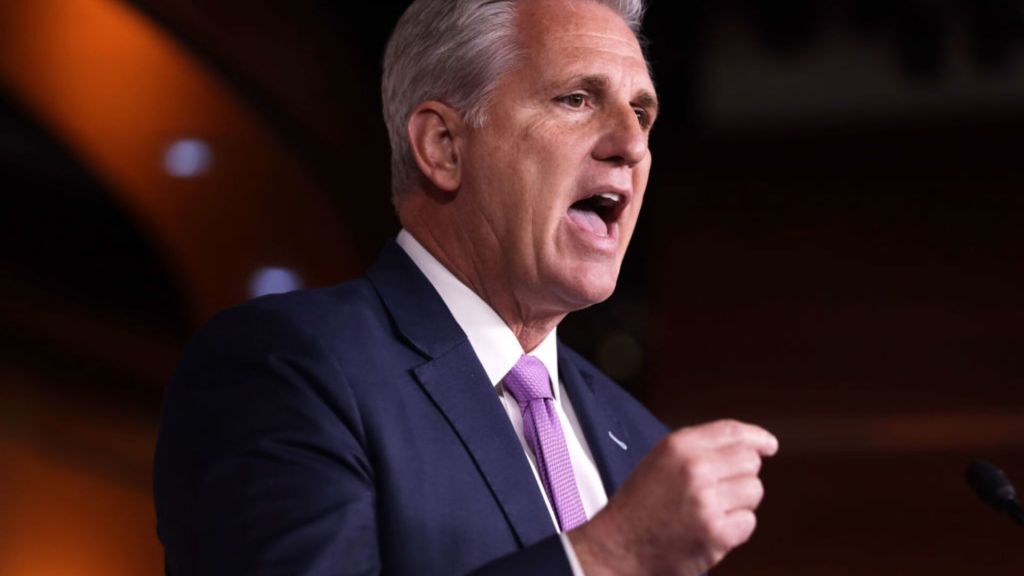President Biden and congressional leaders met at the White House to discuss a solution to the debt ceiling impasse. Time is running out, as America may not have the money it needs to pay its debts as early as June 1.
When House Speaker Kevin McCarthy, R-Calif., left the meeting, he told reporters they didn’t make any progress.
“Everybody in this meeting reiterated the positions they were at. I didn’t see any new movement,” Speaker McCarthy said. “But I was very clear with the president. We have now just two weeks to go. If Chuck Schumer could pass something we’d go to conference right away and solve that. But I don’t think Chuck Schumer can pass anything. They haven’t dealt with it.”
Senate Minority Leader Mitch McConnell, R-Ky., said the president and Democrats must negotiate. He also tried to instill confidence in the economy. But McConnell said elections have consequences, and the 2020 election created a divided government with Republicans and Democrats both controlling chambers of Congress.
“The United States is not going to default. It never has and it never will,” McConnell said. “There is no sentiment in the Senate, certainly not 60 votes, for a clean debt ceiling. So there must be an agreement and the sooner the president and the speaker can reach an agreement, the sooner we can solve the problem.”
Sen. Majority Leader Chuck Schumer, D-N.Y., also said there are many differences between parties.
“The bad news, we explicitly asked speaker McCarthy – would he take default off the table? He refused,” Schumer said. “And that is a shame because that makes things more complicated.”
Democrats struck back at Republican accusations that they have wasted time on negotiations. Democrats said President Biden released a budget proposal that should be a starting point for negotiations.
“We saw no Republican plan, no Republican budget, and then on April 26th, they passed one that was extreme,” House Minority Leader Hakeem Jeffries, D-N.Y., said.
House Republicans passed a bill to increase the debt ceiling by $1.5 trillion and make significant spending cuts. It was dead on arrival in the Democratic-controlled Senate where Majority Leader Schumer once described it as a “thing” rather than legislation.
Neither Democratic leaders in Congress nor President Biden budged from their stance – the debt ceiling increase cannot be negotiated and spending cuts must be done separately.
“People have asked, well will the president give Speaker McCarthy an off ramp, an exit strategy? The exit strategy is very clear – do your job. Congress must act, prevent a default,” White House Press Secretary Karine Jean-Pierre said ahead of the meeting. “That’s what the president view [sic] as success.”
When the United States hit the debt ceiling on Jan. 19, Senate Republican leadership framed the issue as a debate between Speaker McCarthy and President Biden. But just days ahead of this crucial White House meeting, they came out in full support of McCarthy.
In a letter to Schumer, 43 members of the Senate GOP conference said they would not vote in favor of a clean debt ceiling increase without “substantive spending and budget reforms.”
“The Senate Republican conference is united behind the House Republican conference in support of spending cuts and structural budget reform as a starting point for negotiations on the debt ceiling,” the letter stated.
The signees included McConnell, who is now giving full public support to McCarthy.
“President Biden needs to negotiate on spending with Speaker McCarthy,” McConnell said. “House and Senate Democrats have no plan. No proposal. They have no bill to raise the debt ceiling that could pass either the House or the Senate, let alone both. So the choice is President Biden’s. Either he drives the country into default, or he comes to the table.”
What’s not being negotiated is the impact a debt default could have on the economy. According to Moody’s, a short-term default would cause a mild recession, dropping GDP .5% and costing about 1 million jobs. A prolonged breach would cost 7 million jobs through 2024 and the economic downturn “would be comparable to that suffered during the global financial crisis.”

